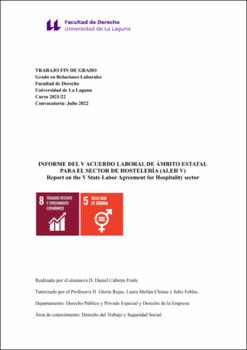Informe del V Acuerdo de ámbito estatal para el sector de la Hostelería ( ALEH V).
Autor
Cabrera Fraile, DanielFecha
2022Resumen
This report on the 5th State Labor Agreement for the Hotel and Catering
Industry includes the characteristics and basic regulations of the agreement
that all hotel and catering companies have to adopt, regardless of whether
they can be supplemented by the regulations of the provincial collective
bargaining agreements for the sector.
A brief historical review of the different agreements that have been in place
since it was considered necessary to establish and change the latest
regulations in force.
First of all, the regulations on the areas of application of this agreement, such
as the temporary, personal and functional scope, are included.
The structure and composition of collective bargaining, which is the body in
charge of the whole development of the agreement.
The aim of this work is to identify the most important clauses of the
agreement, such as the obligatory and normative clauses, as well as the
complementarity and supplementarity assumptions that can be found, and
the way of organizing the delegation of competences to the different
autonomous communities. Este informe del V Acuerdo Laboral Estatal de Hostelería recoge las
características y la normativa básica del convenio que todas las empresas de
hostelería tienen que adoptar, con independencia de que puedan ser
complementadas por normativa de los convenios colectivos provinciales del
sector.
Un breve repaso histórico de los distintos acuerdos que ha habido desde que
se consideraba que era necesario establecer y cambiar la última normativa
vigente
En primer lugar se recoge la normativa sobre los ámbitos de aplicación del
presente acuerdo, como puede ser el ámbito temporal, personal y funcional.
La estructura y composición de la negociación colectiva que es el órgano
encargado de todo el desarrollo del acuerdo.
Con este trabajo se pretende identificar las cláusulas más importantes de
dicho acuerdo, como pueden ser la cláusulas obligacionales y normativas,
como los supuestos de complementariedad y suplementariedad que podemos
encontrar, así como la forma de organizar la delegación de las competencias a
las distintas comunidades autónomas





